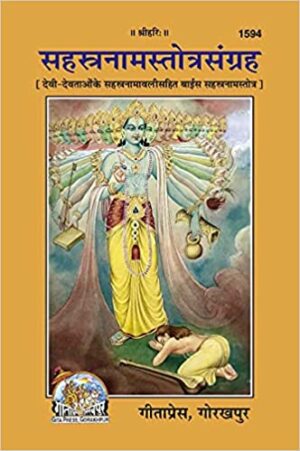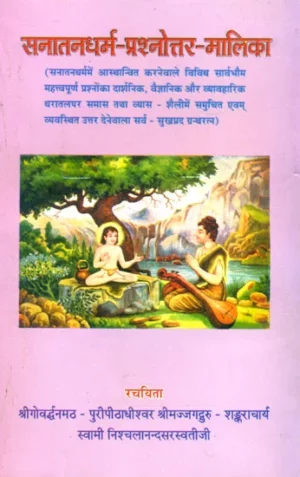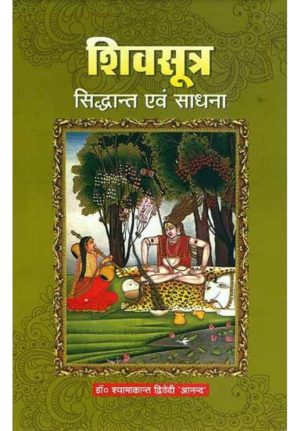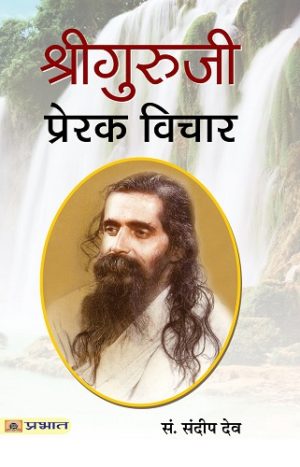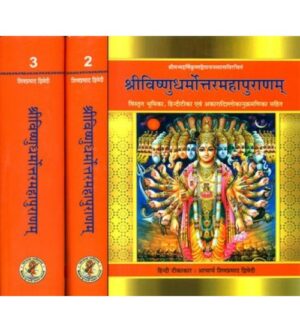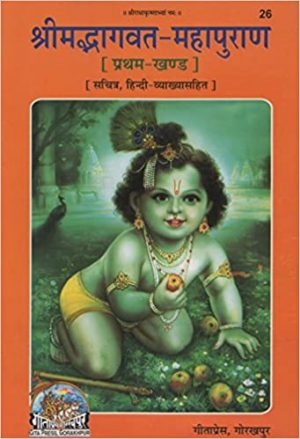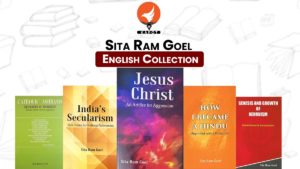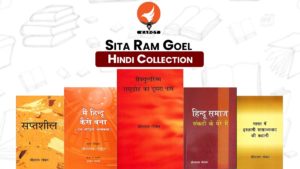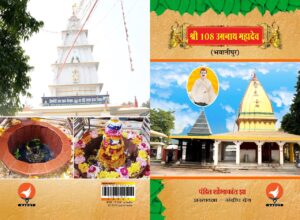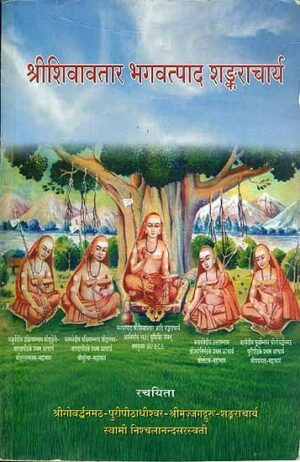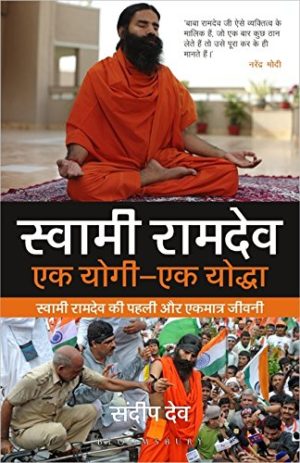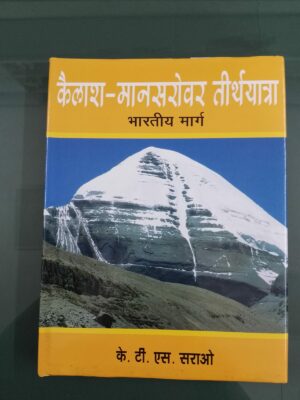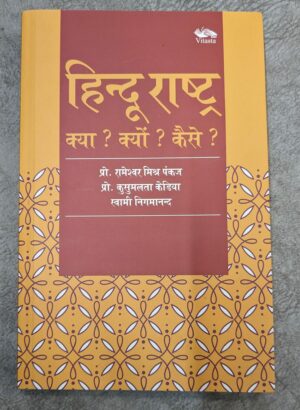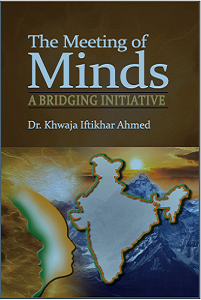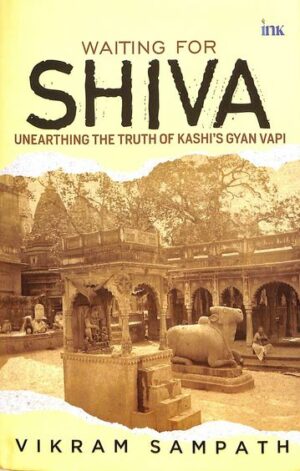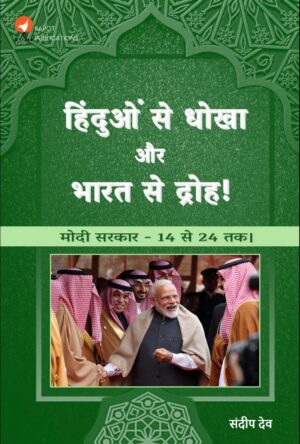Suggested Books
Showing 97–120 of 138 results
-
English Books, Prabhat Prakashan, Suggested Books, इतिहास, जीवनी/आत्मकथा/संस्मरण, सनातन हिंदू जीवन और दर्शन
Saat Chiranjeevi: The 7 Immortals Book
-10%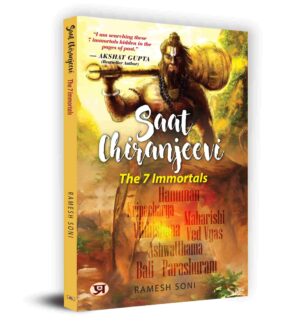 English Books, Prabhat Prakashan, Suggested Books, इतिहास, जीवनी/आत्मकथा/संस्मरण, सनातन हिंदू जीवन और दर्शन
English Books, Prabhat Prakashan, Suggested Books, इतिहास, जीवनी/आत्मकथा/संस्मरण, सनातन हिंदू जीवन और दर्शनSaat Chiranjeevi: The 7 Immortals Book
‘Saat Chiranjeevi’ unveils the remarkable stories of seven extraordinary individuals who have defied the very boundaries of life and death. These revered beings, known as the Seven Immortals, include Parashuram, Bali Vibhishana, Hanuman, Maharishi Ved Vyas, Kripacharya, and Ashwatthama. The book shatters common misconceptions about these illustrious figures. The book also delves into the unwavering devotion of Hanuman, the eleventh incarnation of Rudra, illustrating the rare bond between a devotee and his lord, Lord Rama.The book explores these enduring legends, painting a vivid tapestry of devotion, sacrifice, and immortality in the world of Indian mythology.
SKU: n/a -
Kapot Prakashan, Sandeep Deo Books, Suggested Books, राजनीति, पत्रकारिता और समाजशास्त्र, सही आख्यान (True narrative)
Sajish Ki Kahani Tathyo Ki Zubani (Hindi, Sandeep Deo)
-33%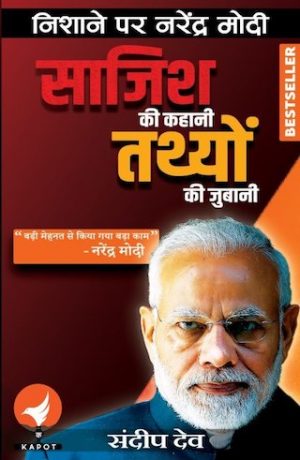 Kapot Prakashan, Sandeep Deo Books, Suggested Books, राजनीति, पत्रकारिता और समाजशास्त्र, सही आख्यान (True narrative)
Kapot Prakashan, Sandeep Deo Books, Suggested Books, राजनीति, पत्रकारिता और समाजशास्त्र, सही आख्यान (True narrative)Sajish Ki Kahani Tathyo Ki Zubani (Hindi, Sandeep Deo)
THE AUTHOR
 संदीप देव
संदीप देवसंदीप देव मूलतः समाज शास्त्र और इतिहास के विद्यार्थी हैं | बनारस हिन्दू विश्वविद्यालय से स्नातक (समाजशास्त्र) करने के दौरान न केवल समाजशास्त्र, बल्कि इतिहास का भी अध्ययन किया है । मानवाधिकार से परास्नातक की पढ़ाई करने के दौरान भी मानव जाति के इतिहास के अध्ययन में इनकी रुचि रही है । वीर अर्जुन, दैनिक जागरण, नईदुनिया, नेशनलदुनिया जैसे अखबारों में 15 साल के पत्रकारिता जीवन में इन्होंने लंबे समय तक क्राइम और कोर्ट की बीट कवर किया है । हिंदी की कथेतर (Non-fiction) श्रेणी में संदीप देव भारत के Best sellers लेखकों में गिने जाते हैं । इनकी अभी तक 9 पुस्तकें प्रकाशित हो चुकी हैं । संदीप देव भारत में Bloombury Publishing के पहले मौलिक हिंदी लेखक थे, लेकिन वैचारिक कारणों से इन्होंने Bloombury से अपनी अब तक प्रकाशित सभी पुस्तकें वापस ले ली हैं । ऐसा करने वाले वो देश के एक मात्र लेखक हैं | इसके उपरांत कपोत प्रकाशन को पुनः प्रारंभ करने का निर्णय लिया गया। वर्तमान में संदीप देव हिंदी के एकमात्र लेखक हैं, जिनकी पुस्तकों ने बिक्री में लाख के आंकड़ों को पार किया है | संदीप देव indiaspeaksdaily.com के संस्थापक संपादक हैं ।
SKU: n/a -
Hindi Books, Prabhat Prakashan, Suggested Books, ऐतिहासिक नगर, सभ्यता और संस्कृति, सनातन हिंदू जीवन और दर्शन
Sanatan Jeevan Shaili (PB)
-15%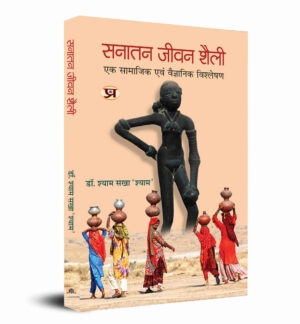 Hindi Books, Prabhat Prakashan, Suggested Books, ऐतिहासिक नगर, सभ्यता और संस्कृति, सनातन हिंदू जीवन और दर्शन
Hindi Books, Prabhat Prakashan, Suggested Books, ऐतिहासिक नगर, सभ्यता और संस्कृति, सनातन हिंदू जीवन और दर्शनSanatan Jeevan Shaili (PB)
“1967 में मेडिकल कॉलेज में मेरे द्वितीय वर्ष के दौरान सनातन में मेरी रुचि जर्मन
सार्शनिक आर्थर शोपेनहावर की एक पंक्ति से शुरू हुई। मैंने शिवमूर्ति को देखा और जन पाया, इसका जिक्र मेरी इसी किताब में है ।पश्चिमी विचारों के प्रभाव में मैं भी मूर्तिपूजा को एक रूढ़िवादी मानसिकता मानता था।
मुझे लगा कि हजारों साल से चली आ रही ये मान्यताएँ जिन्हें लोगों ने अंधविश्वास कहकर खारिज कर दिया है, निरर्थक तो नहीं हो सकतीं, जैसे
मंगलवार को बाल न कटवाना, हनुमान की नाराजगी से डरना या शनिदेव के कोप से बचने के लिए शनिवार को लोहा न खरीदना ।मैं यह सब सोचने लगा । ऐसा लगता है कि ये रीति-रिवाज नाइयों और लोहारों को एक दिन की छुट्टी देने के लिए बनाए गए थे। मार्च महीने में जब घर में शीतला माता की पूजा के लिए बासी भोजन की व्यवस्था देखी तो लगा कि समाज को यह संदेश दिया जा रहा था कि गरमियाँ शुरू होते ही बासी भोजन खाना बंद कर दें।फिर तो मैं सनातन की यात्रा पर निकल पड़ा। मैंने अंधविश्वास कहे ही जाने वाली मान्यताओं पर लोगों से अपने विचार साझा किए और चर्चाओं में शामिल हुआ, लोगों से सकारात्मक
प्रतिक्रियाएँ प्राप्त हुईं। मैं यह दावा नहीं करता कि मेरे विचार सौ प्रतिशत सही हैं, लेकिन मैं विश्वास के साथ कह सकता हूँ कि चिकित्सा ज्ञान में मेरी वैज्ञानिक पृष्ठभूमि ने निश्चित रूप से मुझे सनातन प्रथाओं को समझने में सक्षम बनाया है।
SKU: n/a -
Hindi Books, Kapot Prakashan, Sandeep Deo Books, Suggested Books, इतिहास, राजनीति, पत्रकारिता और समाजशास्त्र
Sandeep Deo Hindi Collection Book
-15% Hindi Books, Kapot Prakashan, Sandeep Deo Books, Suggested Books, इतिहास, राजनीति, पत्रकारिता और समाजशास्त्र
Hindi Books, Kapot Prakashan, Sandeep Deo Books, Suggested Books, इतिहास, राजनीति, पत्रकारिता और समाजशास्त्रSandeep Deo Hindi Collection Book
- Kahani Communisto Ki: Khand 1 (1917-1964)
- Hamare Shri Guruji – Hindi (PB)
- Sajish Ki Kahani Tathyo Ki Zubani (Hindi, Sandeep Deo)
- Swami Ramdev Ek Yogi Ek Yodha
- Shri Guruji : Prerak Vichar (Hindi)
SKU: n/a -
Hindi Books, Prabhat Prakashan, Suggested Books, इतिहास, जीवनी/आत्मकथा/संस्मरण
Savarkar Samagra (Set of Ten Vols.)
-17%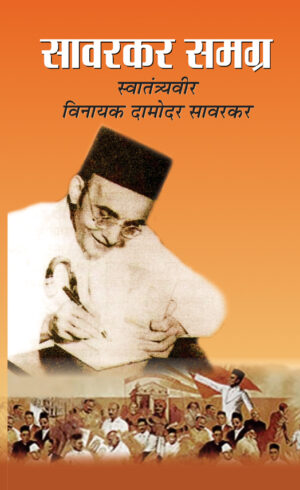 Hindi Books, Prabhat Prakashan, Suggested Books, इतिहास, जीवनी/आत्मकथा/संस्मरण
Hindi Books, Prabhat Prakashan, Suggested Books, इतिहास, जीवनी/आत्मकथा/संस्मरणSavarkar Samagra (Set of Ten Vols.)
‘सावरकर’ शब्द साहस, शौर्य, पराक्रम और राष्ट्रभक्ति का पर्याय है। क्रांतिकारी इतिहास के स्वर्णिम पृष्ठों पर अंकित स्वातंत्र्यवीर सावरकर का समूचा व्यक्तित्व अप्रतिम गुणों से संपन्न था । मातृभूमि की स्वतंत्रता के लिए प्राण हथेली पर रखकर जूझनेवाले महान् क्रांतिकारी; जातिभेद, अस्पृश्यता व अंधश्रद्धा जैसी सामाजिक बुराइयों को समूल नष्ट करने का आग्रह करनेवाले महान् द्रष्टा; ‘ गीता ‘ के कर्मयोग सिद्धांत को अपने जीवन में आचरित करनेवाले अद्भुत कर्मचोगी; अनादि- अनंत परमात्मा का प्राणमय प्रस्कुरण स्वयं के अंदर सदैव अनुभव करते हुए अंदमान जेल की यातनाओं को धैर्यपूर्वक सहनेवाले महान् दार्शनिक, अपने तेजस्वी विचारों से सहस्रों श्रोताओं को झकझोर देने और उन्हें सम्मोहित करनेवाले अद्भुत वक्ता तथा कविता, उपन्यास, कहानी, चरित्र, आत्मकथा, इतिहास, निबंध आदि विभिन्न विधाओं में उच्च कोटि के साहित्य की रचना करनेवाले प्रतिभाशाली साहित्यकार थे स्वातंत्र्यवीर विनायक दामोदर सावरकर ।
स्वतंत्रता-संग्राम एवं समाज-सुधार जैसे क्षेत्रों में महत्त्वपूर्ण कार्य करनेवाला व्यक्ति उच्च कोटि का साहित्यकार भी हो, यह अपवाद है- और इस अपवाद के प्रत्यक्ष प्रमाण हैं वीर सावरकर ।
भारतीय वाड्मय में उनके साहित्य का अत्यंत महत्त्वपूर्ण स्थान है; किंतु वह अधिकांश मराठी में उपलब्ध होने के कारण इस महान् साहित्यकार के अप्रतिम योगदान के बारे में अन्य भारतीय भाषाओं के पाठक अधिक परिचित नहीं हैं ।
वीर सावरकर के चिर प्रतीक्षित समग्र साहित्य का प्रकाशन हिंदी जगत् के लिए गौरव की बात है ।SKU: n/a -
Prabhat Prakashan, Suggested Books, जीवनी/आत्मकथा/संस्मरण
Shri Guruji : Prerak Vichar (Hindi)
विश्व के सबसे बड़े स्वयंसेवी संगठन ‘राष्ट्रीय स्वयंसेवक संघ’ के द्वितीय सरसंघचालक श्री माधवराव सदाशिवराव गोलवलकर उपाख्य ‘श्रीगुरुजी’ आध्यात्मिक विभूति थे। सन् 1940 से 1973 तक करीब 33 वर्ष संघ प्रमुख होने के नाते उन्होंने न केवल संघ को वैचारिक आधार प्रदान किया, उसके संविधान का निर्माण कराया, उसका देश भर में विस्तार किया, पूरे देश में संघ की शाखाओं को फैलाया।
SKU: n/a -
Gita Press, Hindi Books, Suggested Books, महाभारत/कृष्णलीला/श्रीमद्भगवद्गीता
Shrimad Bhagwat Mahapuran (Vol.2)
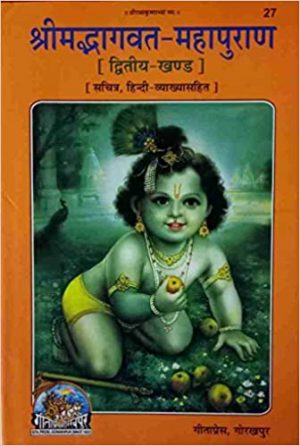 Gita Press, Hindi Books, Suggested Books, महाभारत/कृष्णलीला/श्रीमद्भगवद्गीता
Gita Press, Hindi Books, Suggested Books, महाभारत/कृष्णलीला/श्रीमद्भगवद्गीताShrimad Bhagwat Mahapuran (Vol.2)
श्रीमदभागवत भारतीय वाङ्मयका मुकुटमणि है। इस के प्रत्येक श्लोक में श्रीकृष्ण-प्रेम की सुगन्धि है। इसमें साधन-ज्ञान, सिद्धज्ञान, साधन-भक्ति, सिद्धा-भक्ति, मर्यादा-मार्ग, अनुग्रह-मार्ग, द्वैत, अद्वैत समन्वय के साथ प्रेरणादायी विविध उपाख्यानों का अद्भुत संग्रह है। कलि सन्तरण का साधन-रूप यह सम्पूर्ण ग्रन्थ-रत्न मूल के साथ हिन्दी-अनुवाद, पूजन-विधि, भागवत-माहात्म्य, आरती, पाठ के विभिन्न प्रयोगों के साथ दो खण्डों में उपलब्ध है।
Srimadbhagavat Mahapuran has occupied its place as a crest-jewel among all the Indian literature. It is a step towards the path of devotion. Its each Shloka is full of fragrance with Shri Krishna’s love. This voluminous didactic doctrine contains the means of knowledge, a pathway to devotion. Available in two volumes. Bound with pictures.SKU: n/a -
Gita Press, Hindi Books, Suggested Books, रामायण/रामकथा
Shrimad Valmikiya Ramayan- Vol.1 & 2 (Code 75 & 76)
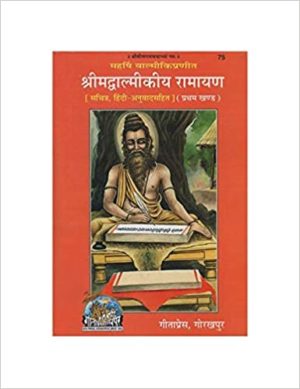 Gita Press, Hindi Books, Suggested Books, रामायण/रामकथा
Gita Press, Hindi Books, Suggested Books, रामायण/रामकथाShrimad Valmikiya Ramayan- Vol.1 & 2 (Code 75 & 76)
त्रेतायुग में महर्षि वाल्मीकि के श्रीमुख से साक्षात वेदों का ही श्रीमद्रामायण रूप में प्राकट्य हुआ, ऐसी आस्तिक जगत की मान्यता है। अतः श्रीमद्रामायण को वेदतुल्य प्रतिष्ठा प्राप्त है। धराधाम का आदिकाव्य होने से इस में भगवान के लोकपावन चरित्र की सर्वप्रथम वाङ्मयी परिक्रमा है। इसके एक-एक श्लोक में भगवान के दिव्य गुण, सत्य, सौहार्द्र, दया, क्षमा, मृदुता, धीरता, गम्भीरता, ज्ञान, पराक्रम, प्रज्ञा-रंजकता, गुरुभक्ति, मैत्री, करुणा, शरणागत-वत्सलता जैसे अनन्त पुष्पों की दिव्य सुगन्ध है। मूल के साथ सरस हिन्दी अनुवाद में दो खण्डों में उपलब्ध। सचित्र, सजिल्द।
SKU: n/a -
Akhil Bhartiya Sanskriti Samanvay Sansthan, Hindi Books, Suggested Books, इतिहास, सही आख्यान (True narrative)
Shuddhi Aandolan ka Sankshipt Itihaas
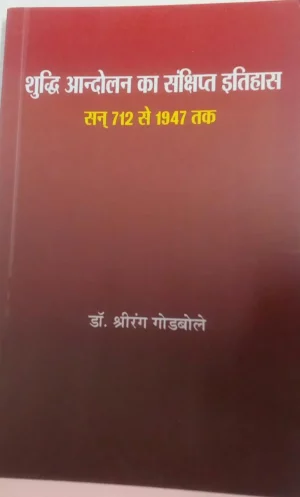 Akhil Bhartiya Sanskriti Samanvay Sansthan, Hindi Books, Suggested Books, इतिहास, सही आख्यान (True narrative)
Akhil Bhartiya Sanskriti Samanvay Sansthan, Hindi Books, Suggested Books, इतिहास, सही आख्यान (True narrative)Shuddhi Aandolan ka Sankshipt Itihaas
अन्य उपासना-मतों में, विशेषकर इस्लाम एवं ईसाइयत में मतान्तरित हिन्दुओं का अपने मूल धर्म और समाज में वापस आने की प्रक्रिया ‘घरवापसी’ नाम से लोकप्रिय हुई है। इस प्रक्रिया को ‘शुद्धि’ या “परावर्तन’ भी कहा जाता है। भारत में रहने वाले अधिकांश मुस्लिमों और ईसाइयों के पूर्वज हिन्दू ही थे। किसी समय भय या धोखे से उन्हें मतान्तरित किया गया था। भारत के वर्तमान मुस्लिम और ईसाई इतिहासकाल में बिछुड़े हुए अपने ही बंधुओं की संतान है। मतान्तरण यह दासता का आविष्कार है।
मतान्तरित व्यक्ति और समाज उस इतिहासकालीन दासता के अवशेष हैं। मतान्तरित बंधुओं को स्वगृह में लाने और उन्हें मातृसमाज में आत्मसात करने का प्रयास इस्लामी आक्रमण के तुरंत बाद शुरू हुआ। अपने ऋषि मनीषियों ने इस प्रक्रिया को धर्मशास्त्र का आधार दिया।
अपने बिछुड़े हुए बंधुओं को आत्मसात करने के प्रयास ऋषियों, साधु-संतों, राजा महाराजाओं, धार्मिक-सामाजिक-राजनीतिक नेताओं और सामान्य लोगों ने किए। सन् 1947 को राजनीतिक स्वतंत्रता प्राप्ति भारत के इतिहास में महत्त्वपूर्ण पड़ाव था। सैकड़ों वर्षों के इस कालावधि में हुए शुद्धिकरण के प्रयासों की तथ्यपरक जानकारी इस पुस्तक में संक्षेप में दी गई है।
SKU: n/a -
English Books, Occam (An Imprint of BluOne Ink), Suggested Books, अध्यात्म की अन्य पुस्तकें, सही आख्यान (True narrative)
Snakes in the Ganga (HB)
-11%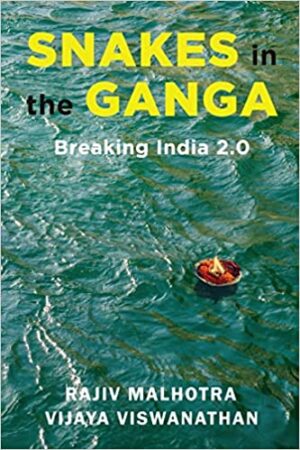 English Books, Occam (An Imprint of BluOne Ink), Suggested Books, अध्यात्म की अन्य पुस्तकें, सही आख्यान (True narrative)
English Books, Occam (An Imprint of BluOne Ink), Suggested Books, अध्यात्म की अन्य पुस्तकें, सही आख्यान (True narrative)Snakes in the Ganga (HB)
Snakes in the Ganga: Breaking India 2.0
Snakes in the Ganga unveils uncomfortable truths concerning India’s vulnerabilities: Intense warfare against India’s integrity is the work of a well-orchestrated global machinery driven by a new ideology. Marxism has been reincarnated as Critical Race Theory in US academia and serves as the framework to address America’s racism. This has been recklessly mapped on to India:Caste is equated with Race. Marginalized communities of India are considered as Blacks and Brahmins as the Whites of India. Groups claiming grievances (like Muslims and LGBTQ+) are artificially clubbed together. Popularly called the Woke movement, the mission is to dismantle Indian civilization and heritage by waging an uncompromising war against India’s government, educational institutions, culture, industry, and society. Harvard University is Ground Zero of these social theories developed in collaboration with Indian scholars, activists, journalists and artists. This represents a clear and present danger to India’s sovereignty and national security. Several Indian elites are hoisting Harvard as the vishwa guru with their money and family names. Some private universities within India are importing Wokeism that has serious repercussions for India’s stability. Indian corporates are bringing the latest Western rubric of Environmental, Social, and Governance ratings into their workplace. This is aligned with the global Social Justice movement. China has exploited this latest infrastructure as a passage to India. Wokeism has penetrated some of the Indian government’s policies. For instance, the National Education Policy 2020 is propagating Harvard’s liberal arts. An entire ecosystem of ideologies, institutions and young leaders is emerging for the recolonization of India. Is India for sale?
SKU: n/a -
English Books, Occam (An Imprint of BluOne Ink), Suggested Books, अध्यात्म की अन्य पुस्तकें, सही आख्यान (True narrative)
Snakes in the Ganga (PB)
-13%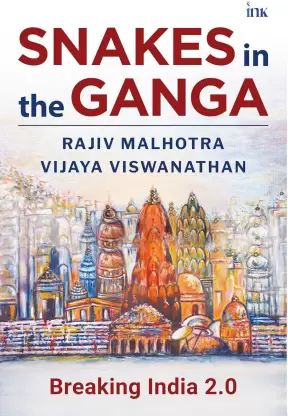 English Books, Occam (An Imprint of BluOne Ink), Suggested Books, अध्यात्म की अन्य पुस्तकें, सही आख्यान (True narrative)
English Books, Occam (An Imprint of BluOne Ink), Suggested Books, अध्यात्म की अन्य पुस्तकें, सही आख्यान (True narrative)Snakes in the Ganga (PB)
Snakes in the Ganga: Breaking India 2.0
Snakes in the Ganga unveils uncomfortable truths concerning India’s vulnerabilities: Intense warfare against India’s integrity is the work of a well-orchestrated global machinery driven by a new ideology. Marxism has been reincarnated as Critical Race Theory in US academia and serves as the framework to address America’s racism. This has been recklessly mapped on to India:Caste is equated with Race. Marginalized communities of India are considered as Blacks and Brahmins as the Whites of India. Groups claiming grievances (like Muslims and LGBTQ+) are artificially clubbed together. Popularly called the Woke movement, the mission is to dismantle Indian civilization and heritage by waging an uncompromising war against India’s government, educational institutions, culture, industry, and society. Harvard University is Ground Zero of these social theories developed in collaboration with Indian scholars, activists, journalists and artists. This represents a clear and present danger to India’s sovereignty and national security. Several Indian elites are hoisting Harvard as the vishwa guru with their money and family names. Some private universities within India are importing Wokeism that has serious repercussions for India’s stability. Indian corporates are bringing the latest Western rubric of Environmental, Social, and Governance ratings into their workplace. This is aligned with the global Social Justice movement. China has exploited this latest infrastructure as a passage to India. Wokeism has penetrated some of the Indian government’s policies. For instance, the National Education Policy 2020 is propagating Harvard’s liberal arts. An entire ecosystem of ideologies, institutions and young leaders is emerging for the recolonization of India. Is India for sale?
SKU: n/a -
Chaukhamba Prakashan, Hindi Books, Suggested Books, वेद/उपनिषद/ब्राह्मण/पुराण/स्मृति
Sri Bhavishya Mahapuranam (Set Of 3 Vols)
-10%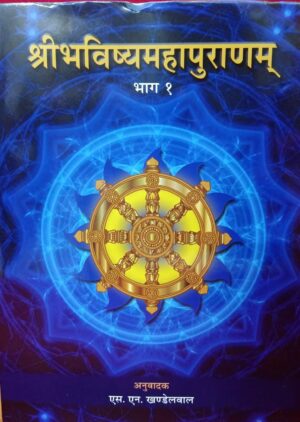 Chaukhamba Prakashan, Hindi Books, Suggested Books, वेद/उपनिषद/ब्राह्मण/पुराण/स्मृति
Chaukhamba Prakashan, Hindi Books, Suggested Books, वेद/उपनिषद/ब्राह्मण/पुराण/स्मृतिSri Bhavishya Mahapuranam (Set Of 3 Vols)
प्रस्तुत भविष्यपुराण में भगवान सूर्य की महिमा का वर्णन किया गया है ।
व्यास जी द्वारा रचित हमारे 18 वैदिक पुराणों मे से भविष्य पुराण भी एक है…
भविष्य पुराण में सूर्य का महत्व और वर्ष के 12 महीनों के निर्माण का उल्लेख मिलती है। इस पुराण में सांपों की पहचान, विष और विषदंश की संपूर्ण जानकारी दी गई है। इस पुराण में राजवंशों के अतिरिक्त भविष्य में आने वाले नंद वंशों, मौर्य वंशों, मुगल वंश, छत्रपति शिवाजी और महारानी विक्टोरिया का वर्णन मिलता है। साथ ही विक्रम बेताल और बेताल पच्चीसी की कथाएं भी इसी का हिस्सा है।
SKU: n/a -
Chaukhamba Prakashan, Hindi Books, Suggested Books, वेद/उपनिषद/ब्राह्मण/पुराण/स्मृति
Srimad Bhagwat Mahapuran Set Of 9 Vols
-15%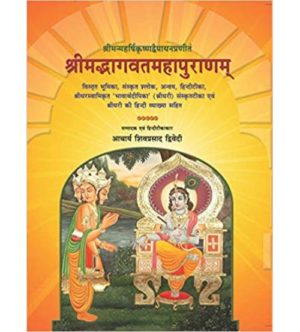 Chaukhamba Prakashan, Hindi Books, Suggested Books, वेद/उपनिषद/ब्राह्मण/पुराण/स्मृति
Chaukhamba Prakashan, Hindi Books, Suggested Books, वेद/उपनिषद/ब्राह्मण/पुराण/स्मृतिSrimad Bhagwat Mahapuran Set Of 9 Vols
Acharya Shiv Prasad Dvivedi
Srimad Bhagwat Mahapuran (श्रीमद्भागवतमहापुराण) विस्तृत भूमिका,मूलश्लोक,अन्वय,हिंदीटीका,श्रीधरस्वामी कृत भावार्थदीपिका (श्रीधरी) टीका एवं श्रीधरी की हिंदीव्याख्या एवं अकारादिश्लोकनुक्रामनिका सहितSKU: n/a

